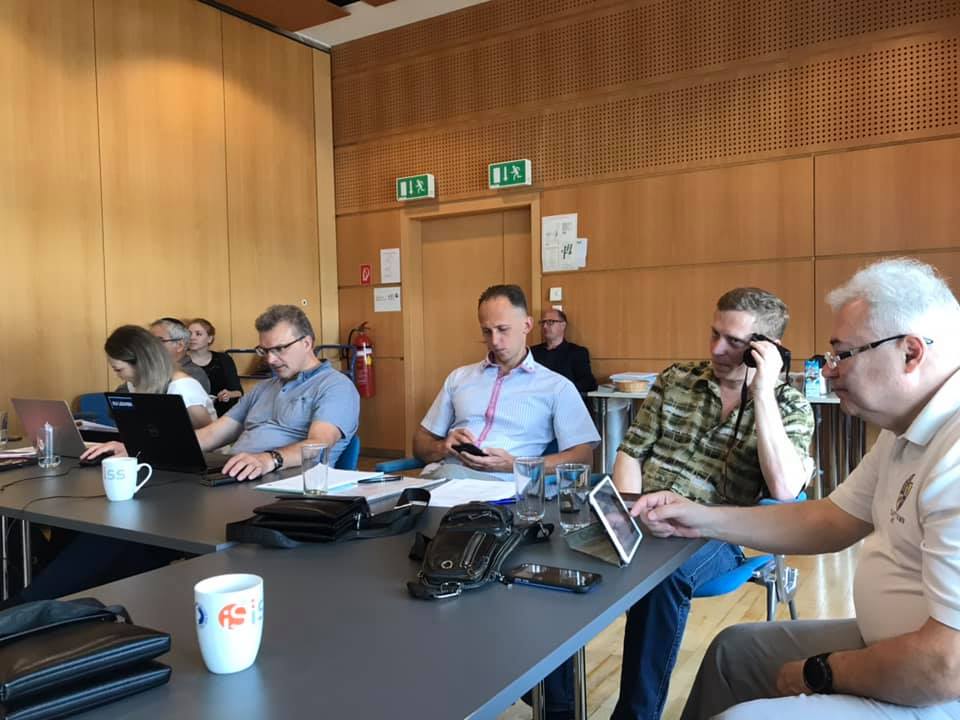[vc_row][vc_column][vc_column_text]
As an important part of BIOART, the partners developed bionic labs, which will serve in each institutions for the students. Since each institution has its own aims and means, the practical implementation of the bionic labs is different from one partner to the other. However, they all illustrate the diversity of the different fields involved in the BIOART project, as well as encourages multidisciplinary teaching. The different bionic labs are detailed below.
[/vc_column_text][vc_separator color=”sky” style=”double” border_width=”2″][vc_column_text]
VNTU
Within the framework of the project, VNTU purchased equipment worth more than 30k euros (Interactive SMART board with projector for educational process, Virtual Reality Helmet, 3D Scaner, Desktop FDM 3D Printer, Desktop SLA 3D Printer, Computer System for Virtual Reality and FEМ, Desktop Universal Testing Machine, Laser Cutting Machine, Digital Oscilloscope, Digital Microscope, Power Supply Programmable, Laptop). The equipment was put into operation. Two laboratories were established (Laboratory Center Bioart and BioniсLab), in which this equipment was installed. Now the equipment is used in the educational process of VNTU for laboratory work in courses developed within the framework of the bioart project. Laboratories are an advertising part in order to attract enrollees and employers in the field of bioengineering.
To see a short movie about the VNTU bionic lab, click here
[/vc_column_text][vc_gallery type=”image_grid” images=”138566,138567,138568,138569,138570,138571,138572,138573,138574″][vc_separator color=”sky” style=”double” border_width=”2″][vc_column_text]
HIT
The bionic lab created during the project includes an Artificial Intelligence lab and a Brain-Computer Interface lab. The AI lab is equipped with state-of-the-art workstations for computational intensive calculations of Deep Learning methods in the field of bioengineering and bio-artificial implants. The Hybrid BCI Lab was furnished by equipment bought by this Erasmus+ project.
[/vc_column_text][vc_gallery type=”image_grid” images=”137622,137621,137620,137619,137618″][vc_separator color=”sky” style=”double” border_width=”2″][vc_column_text]
BIU
The bionic lab of Bar-Ilan University includes a cluster to perform heavy computations required in the field of data science for biomedical data. In addition to the new courses developed in Data science and Computational methods for biology, the lab provides a valuable addition for students to better understand the challenges in this field
[/vc_column_text][vc_gallery type=”image_grid” images=”138577,138578,138665,138666″ img_size=”medium”][vc_separator color=”sky” style=”double” border_width=”2″][vc_column_text]
SCE
The bionic lab of SCE includes a set of Bitalino cards for biomedical signal recordings, a bioreactor and a 3D printer dedicated to the printing of biomaterials. With the use of the Bitalino cards and associated sensors, the course of Digital Signal Processing updated in the course is enriched by lab works based on recordings made by the students themselves. The bioreactor and the 3D printer are used in the courses belonging to the newly developed Biotech specialization, which is jointly taught to Chemical Engineering and Mechanical Engineering students.
[/vc_column_text][vc_gallery type=”image_grid” images=”138595,138596,138597,138598″ img_size=”medium”][vc_separator color=”sky” style=”double” border_width=”2″][vc_column_text]
NUZP
In the framework of the project, two new laboratories in the National University Zaporizhzhia Polytechnic were created: the “Laboratory of Telemedical and biomedical systems” and the “Laboratory of “Intellectual computing and Virtual reality”.
In the laboratory “Intellectual computing and Virtual reality” students have their labs in Medical Informational Infrastructure, Embedded biomedical systems and Wireless Sensor Networks, Machine Learning and AI. Remote experiments on the investigation of the degradation of the Mg alloys are also performed there.
In the “Laboratory of Telemedical and biomedical systems”, lab sessions are performed for Biomedical Signal Processing, Telemedicine and others.
All laboratories are used for the Bachelor and Master’s degrees.
[/vc_column_text][vc_gallery type=”image_grid” images=”138700,138701,138702,138703,138704,138705,138706,138707,138708,138709,138710,138711,138712,138713,138714″ img_size=”medium”][vc_separator color=”sky” style=”double” border_width=”2″][vc_column_text]
DSEA
In 2019, three laboratories with modern equipment were established at the CIT department and implemented ( ): the Bioelectronics Laboratory, the Biomechanics Laboratory and a video recording studio for distance learning.
In the laboratory “Intellectual computing and Virtual reality” students have their labs in Medical Informational Infrastructure, Embedded biomedical systems and Wireless Sensor Networks, Machine Learning and AI. Remote experiments on the investigation of the degradation of the Mg alloys are also performed there.
The Laboratory of Bioelectronics is equipped with modern electrical equipment for the educational process and research on the setup and diagnostics of various electronic devices, boards, stands, peripherals and more. Equipment funded by the ERASMUS + BIOART project includes among other devices a RIGOL DS1054Z digital oscilloscope and Masteram MR 3005 D-3 adjustable power supply. SIMULIA Academic Research Suite is installed on the computers and used for various calculations. Equipment and software are also used for laboratory and term papers.
A laboratory of biomechanics has also been established, which is equipped with modern research and production equipment and allows to conduct research on the use of modern computer information technologies in the field of mechanics, biomechanics and mechatronics.
[/vc_column_text][vc_gallery type=”image_grid” images=”138747,138748,138749,138751,138752,138753,138754,138755,138756,138757,138759,138760″ img_size=”medium”][vc_separator color=”sky” style=”double” border_width=”2″][vc_column_text]
PSTU
In the frame of BioArt project four study/research laboratories were established in PSTU, at the department of Biomedical Engineering: the “Bionic laboratory of 3D printing”, the “Laboratory of Biotribological Testing”, the “Laboratory of Virtual Reality” and the “Laboratory of diagnostics of medical equipment”. All these laboratories were officially opened in October 2020, and have been already repeatedly used for the practical classes and
laboratory works (including the disciplines within the BioArt project). The equipment of “Laboratory of biotribological testing” was used for practical and laboratory classes, as well as for conducting the graduation Bachelor projects and for research projects.
[/vc_column_text][vc_gallery type=”image_grid” images=”138767,138768,138769,138770,138771,138772,138773″ img_size=”medium”][vc_separator color=”sky” style=”double” border_width=”2″][/vc_column][vc_column][/vc_column][/vc_row]

